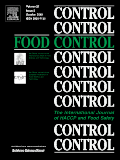
FOOD CONTROL
Scope & Guideline
Championing excellence in food science and technology.
Introduction
Aims and Scopes
- Food Safety and Microbial Control:
Research that addresses the detection, prevention, and control of foodborne pathogens, including the development of novel antimicrobial agents and preservation techniques. - Quality Assurance and Control:
Studies that explore methodologies for assessing and maintaining food quality, including sensory evaluation, chemical analyses, and the impact of processing conditions on food attributes. - Food Preservation Techniques:
Innovative approaches to extend the shelf life of food products through physical, chemical, and biological means, including the use of natural additives and emerging technologies. - Food Authentication and Traceability:
Research focused on the identification and tracing of food products to ensure authenticity and prevent fraud, employing techniques such as DNA barcoding and isotopic analysis. - Consumer Behavior and Food Safety Education:
Studies analyzing consumer perceptions, knowledge, and behaviors regarding food safety, as well as the effectiveness of educational interventions in promoting safe food handling.
Trending and Emerging
- Innovative Preservation Techniques:
Research into non-thermal preservation methods, such as high-pressure processing, cold plasma, and emerging technologies to ensure food safety while maintaining nutritional quality. - Sustainability and Environmental Impact:
Studies that explore sustainable practices in food production and processing, including the use of biopesticides, eco-friendly packaging materials, and waste reduction strategies. - Advanced Analytical Techniques:
The application of cutting-edge technologies, such as machine learning, hyperspectral imaging, and metabolomics, for rapid detection and analysis of food safety parameters. - Biopreservation and Natural Antimicrobials:
A rising interest in using natural compounds and microbial cultures for food preservation, reflecting consumer preferences for clean-label products. - Food Fraud Detection and Authentication:
Increased research focus on methodologies for detecting food fraud, ensuring traceability, and verifying the authenticity of food products through advanced analytical techniques.
Declining or Waning
- Traditional Food Safety Inspections:
The emphasis on conventional food safety inspection methods is waning as there is a shift towards more innovative and technology-driven approaches, such as predictive modeling and real-time monitoring. - Chemical Preservatives:
There is a noticeable decline in research focusing on synthetic chemical preservatives as the industry increasingly leans towards natural alternatives and biopreservation techniques. - General Food Quality Studies:
Broad studies on food quality without a specific focus on safety or technological advancements are becoming less common as the field narrows towards more specialized and impactful research themes.
Similar Journals

CZECH JOURNAL OF FOOD SCIENCES
Unveiling New Discoveries in Food Systems and SafetyCzech Journal of Food Sciences is a premier publication in the field of food science, disseminating vital research since its inception in 1999 and transitioning to Open Access in 2007. Published by the Czech Academy Agricultural Sciences, this journal facilitates the exchange of knowledge among researchers, professionals, and students dedicated to advancing the understanding of food systems, safety, and technology. With an ISSN of 1212-1800 and an E-ISSN of 1805-9317, it holds a respectable position with a Q3 ranking in the Food Science category for 2023, illustrating its commitment to high-quality research despite its Scopus rank of 209 out of 389, situated in the 46th percentile. Located in the heart of the Czech Republic, at TESNOV 17, PRAGUE 117 05, this journal serves as an essential resource for those involved in agricultural and biological sciences, paving the way for innovative discoveries and applications in food science.

ITALIAN JOURNAL OF FOOD SCIENCE
Unlocking the Secrets of Flavor and NutritionITALIAN JOURNAL OF FOOD SCIENCE is a distinguished open-access publication dedicated to advancing knowledge in the field of food science, catering to a global audience of researchers, professionals, and students. Published by Codon Publications in Singapore, this journal, operating under the ISSN 1120-1770 and E-ISSN 2239-5687, has been a vital platform for scholarly discourse since its inception in 1996, converging towards a comprehensive view of food science trends through 2024. With an impressive ranking in the third quartile (Q3) of the Food Science category and a Scopus rank of #151 out of 389, the journal plays a significant role in disseminating high-quality research, contributing to a richer understanding of food science within the agricultural and biological sciences. Since transitioning to open access in 2008, it has further expanded its reach, ensuring that innovative research is accessible to all, thereby fostering collaboration and knowledge exchange in this vital industry.

Food Science of Animal Resources
Advancing Knowledge in Animal Science and Food InnovationFood Science of Animal Resources is a prestigious, peer-reviewed journal published by the Korean Society of Food Science and Animal Resources, serving as a vital platform for disseminating advanced research in the fields of Animal Science and Food Science. Since its inception in 2018, the journal has quickly established itself with an impressive Q1 ranking in both categories for 2023, indicating its relevance and influence in the academic community—evident by its ranking of #23 in Animal Science and Zoology and #78 in Food Science among thousands of journals. Operating on an Open Access model since 2019, it enables unrestricted access to cutting-edge research for a global audience, facilitating collaboration and innovation. Its commitment to quality and rigor makes it an essential resource for researchers, professionals, and students dedicated to advancing knowledge in food safety, nutrition, and sustainable practices within the animal resource sector. Set against the vibrant backdrop of South Korea, the journal aims to bridge gaps in knowledge and foster communication among scholars and practitioners worldwide.
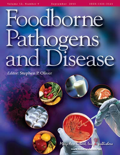
Foodborne Pathogens and Disease
Innovating solutions for a healthier tomorrow.Foodborne Pathogens and Disease is a leading peer-reviewed journal, published by MARY ANN LIEBERT, INC, that focuses on the critical field of food safety and microbiology. With a robust ISSN of 1535-3141 and an E-ISSN of 1556-7125, this journal has established itself as a pivotal resource since its inception in 2004. It serves as an essential platform for researchers, professionals, and students dedicated to understanding the risks associated with foodborne pathogens and their impact on public health. The journal holds impressive rankings, being categorized in Q1 for Animal Science and Zoology and Q2 for Applied Microbiology and Biotechnology and Food Science according to the latest quartiles. Additionally, it ranks high within Scopus, occupying the 90th percentile in Agricultural and Biological Sciences (Animal Science and Zoology). Though not an open-access publication, it provides valuable insights and data that contribute to the evolving discourse on food safety, the prevention of foodborne diseases, and the advancement of biotechnology in food science. As it converges towards its 20th anniversary in 2024, Foodborne Pathogens and Disease continues to be an indispensable source of information for those committed to the betterment of food safety and public health.
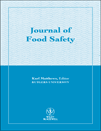
JOURNAL OF FOOD SAFETY
Transforming insights into action for food safety.Journal of Food Safety is a premier resource in the field of food science, offering invaluable insights into food safety practices, microbiology, and parasitology. Published by WILEY, this journal has been a pivotal platform for the dissemination of research since its inception. With an impressive impact factor reflecting its esteemed reputation, the journal caters to a diverse audience of researchers, professionals, and students committed to advancing knowledge in food safety. While currently not an open access journal, it still provides essential findings that contribute significantly to the understanding of foodborne pathogens and preventive measures. Recognized in the Q2 and Q3 quartiles across various relevant disciplines, including Food Science, Microbiology, and Parasitology, the Journal of Food Safety continues to uphold high standards in scientific research and education. Researchers are encouraged to submit their manuscripts and engage with groundbreaking studies that are shaping the future of food safety.

JOURNAL OF FOOD PROTECTION
Driving excellence in food protection science.JOURNAL OF FOOD PROTECTION is a prominent academic journal published by Elsevier, dedicated to the field of Food Science and Microbiology. With an ISSN of 0362-028X and an E-ISSN of 1944-9097, it serves as a vital resource for researchers, professionals, and students interested in the microbiological aspects of food safety and quality. Since its inception, the journal has evolved significantly, with coverage spanning from 1977 to the present, reflecting its long-standing commitment to advancing knowledge in this critical area. Recognized for its rigorous peer-reviewed research, the journal boasts a commendable impact factor and ranks in the second quartile in Food Science and the third quartile in Microbiology according to 2023 assessments. Its Scopus ranking also highlights its relevance, with significant placements in both Agricultural and Biological Sciences and Immunology and Microbiology. The JOURNAL OF FOOD PROTECTION is an essential platform for disseminating pioneering studies that address contemporary challenges facing the food industry and public health, making it an indispensable resource in the quest for food safety and innovation.
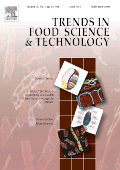
TRENDS IN FOOD SCIENCE & TECHNOLOGY
Exploring the forefront of food science and technology.Trends in Food Science & Technology, published by Elsevier Science London, stands as a premier journal in the fields of food science and biotechnology. With an impressive Q1 ranking in both the food science and biotechnology categories, it is recognized for its rigorous peer-reviewed articles that advance knowledge and innovation in the sector. The journal’s Scopus rankings validate its significance, placing it in the top percentile among its peers, with a remarkable rank of #2 out of 389 in Agricultural and Biological Sciences - Food Science, and #4 out of 311 in Biochemistry, Genetics, and Molecular Biology - Biotechnology. Since its inception in 1990, the journal has become a vital resource for researchers, professionals, and students alike, offering insights into contemporary challenges and trends impacting food technology. Although it operates under a subscription model, the quality of research published within its pages makes it an essential read for anyone involved in advancing the science of food.
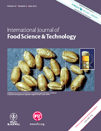
INTERNATIONAL JOURNAL OF FOOD SCIENCE AND TECHNOLOGY
Connecting Researchers to the Heart of Food ScienceINTERNATIONAL JOURNAL OF FOOD SCIENCE AND TECHNOLOGY, published by WILEY, serves as a premier platform for the dissemination of cutting-edge research in the field of food science and technology. With an ISSN of 0950-5423 and E-ISSN 1365-2621, this journal has been committed to publishing high-quality research since 1966 and is set to continue its impactful contributions through 2024. Recognized for its excellence, it holds a Q1 ranking in Food Science and a Q2 ranking in Industrial and Manufacturing Engineering as of 2023. The journal ranks #95/384 in Industrial and Manufacturing Engineering and #100/389 in Food Science on Scopus, placing it within the top quartiles of these fields. Although it does not currently offer Open Access, researchers and professionals benefit from access to a wealth of knowledge that advances understanding in both applied and theoretical aspects of food science. This journal is indispensable for anyone in the academic and professional domains who seeks to stay abreast of innovations and trends shaping the food industry.
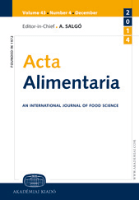
ACTA ALIMENTARIA
Innovating food chemistry and nutrition for a sustainable world.ACTA ALIMENTARIA is a renowned journal in the field of food science, published by AKADEMIAI KIADO ZRT, based in Hungary. Since its inception in 1973, it has served as a vital platform for disseminating high-quality research on food chemistry, microbiology, nutrition, and technology, contributing significantly to the advancement of knowledge in the agricultural and biological sciences. Currently classified in the Q3 quartile of the 2023 Food Science category, the journal is positioned to address pressing issues pertaining to food safety, quality, and sustainability, making it an invaluable resource for researchers, professionals, and students alike. Although it does not currently offer open access, the journal maintains a strong reputation with a readership keenly interested in the latest developments in food science. With a Scopus rank placing it in the 38th percentile of its category, ACTA ALIMENTARIA continues to be a pivotal reference for those engaged in food research and innovation.
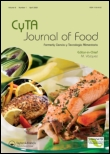
CyTA-Journal of Food
Elevating food research for a healthier tomorrow.CyTA-Journal of Food is a prestigious academic journal published by TAYLOR & FRANCIS LTD, dedicated to advancing the field of food science and technology through the dissemination of innovative research and practical knowledge. With an ISSN of 1947-6337 and an E-ISSN of 1947-6345, this journal stands out with its strong impact factor and is currently placed in the Q2 quartile across multiple categories, including Chemical Engineering, Chemistry, and Food Science, making it a vital resource for researchers and professionals alike. The journal has been an integral part of the academic community since its inception in 2009, and continues to publish cutting-edge articles through to 2024. Its alignment with Scopus ranks further signifies its influence, notably achieving 67th percentile in Industrial and Manufacturing Engineering. As an Open Access journal, it ensures widespread accessibility to its valuable content, promoting collaboration and knowledge sharing among scientists, engineers, and students dedicated to enhancing food safety, quality, and sustainability.